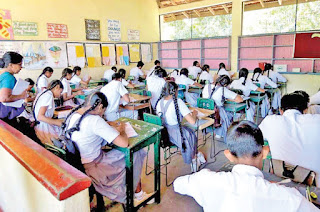wrote last week about the background to English medium being restored to the State system, a subject I think most pertinent to the current situation when there is much blathering about improving English, with little of practical use being done about it. This is in marked contrast to the giant steps taken in the nineties under the guidance of Arjuna Aluvihare at tertiary level and Tara de Mel at secondary, though sadly both of them were got rid of before the reforms they had embarked on were entrenched.
I was able to help both of them in their visionary initiatives, helped in this by the understanding I had derived from my work at the British Council about what the problems were.
I was able to help both of them in their visionary initiatives, helped in this by the understanding I had derived from my work at the British Council about what the problems were.
But then in 2000 I was able to move to the most important change our youngsters needed, which was to allow English medium in the local system. I mentioned last week how Jeevan Thiagarajah brought Tara de Mel and me together at a workshop at the British Council. When I brought up my obsession, and told her how urgent it was to work on this, she said she was going to start it in a couple of schools in Colombo and Kandy. I told her that would be disastrous for it would reaffirm the idea that this was an elitist concept, and she should rather start it nationwide.
She said there would not be enough teachers, but I said there were still enough in the system, and she should make it clear that only those schools which felt they could cope should start. But we should then rapidly engage in teacher training, so that more and more could embark on English medium in the next few years.
She said she would think about it, and that evening she rang me and said she would go ahead, but only if I ran the programme for her. Obviously I had to agree. But when she asked for a concept paper to put to Cabinet, I told her I was going abroad and would get one done when I got back.
But then Jeevan weighed in and called me and insisted I do a draft straight away, and he would if necessary fine tune it with Tara. So he came and sat over me and I was able then to give him a draft, and by the time I came back it had been amended and approved, and we were all ready to commence the programme the following year.
Over the next six months we worked intensively. Tara had wanted to present the Cabinet Paper jointly with the Ministry of National Integration and, though its Secretary was wary of the idea, he agreed on condition that English medium should be confined to secondary level. That was not ideal, but it made sense to compromise, for we had wanted to promote the idea of bringing children of different communities together, with provision for twinning Sinhala and Tamil medium schools where there was interest, and later for combining students of different such schools at the Advanced Level stage in centres of excellence in the various districts where numbers sufficed. That was why we called it the Amity School project, and wanted the Ministry of National Integration involved, though sadly that ideal was of no interest to those who exercised authority later, politicians and ministry personnel, and it ended up being known as just the Bilingual project.
We then had to introduce the project, which Tara did through a meeting at the Ministry of all Zonal Education Directors who were to then spread the work to all schools under their purview, asking those who wanted to embark on the initiative to register with us. Then we had a meeting with the regional English support staff, at Regional English Support Centres as well as what were termed In Service Advisers, to get them on board, with development of systems to mentor teachers who would engage in the project. We wanted them to pay special attention to teachers of subjects that were to be done in English, who had not previous come under their purview. Some were clearly not interested in such extra work, but we were pleased with the level of interest and commitment we did invoke.
Then we had to prepare materials, and to embark on initial teacher training. For this purpose Tara got the support of the World Bank and I had to prepare two project proposals. But I also got her agreement to have a third component, which was the development of a monitoring system, to ensure that schools received books, and that teachers felt supported, both through having a contact point in the Ministry and also through regular visits to check on problems.
93 schools had registered with us by the deadline. There were no State schools in Colombo, except for Ananda College, and its neighbour Asoka Vidyalaya. It turned out that the Zonal Director was opposed to the whole idea. Conversely his neighbour in the Sri Jayewardenepurs Zone was deeply committed, and we had a dozen schools or so from there.
The World Bank projects allowed us to hire consultants, and for the teacher training we appointed as our leads Paru Nagasunderam and Oranee Jansz with whom I had achieved so much at Sri Jayewardenepura and also on the pre-University General English Language Training Course. For materials we sub-contracted the English Association of Sri Lanka, with Nirmali Hettiarachchi to manage the production, for she had done wonders with all the books I had produced through the British Council and then on projects funded by that Canadian International Development Association.




